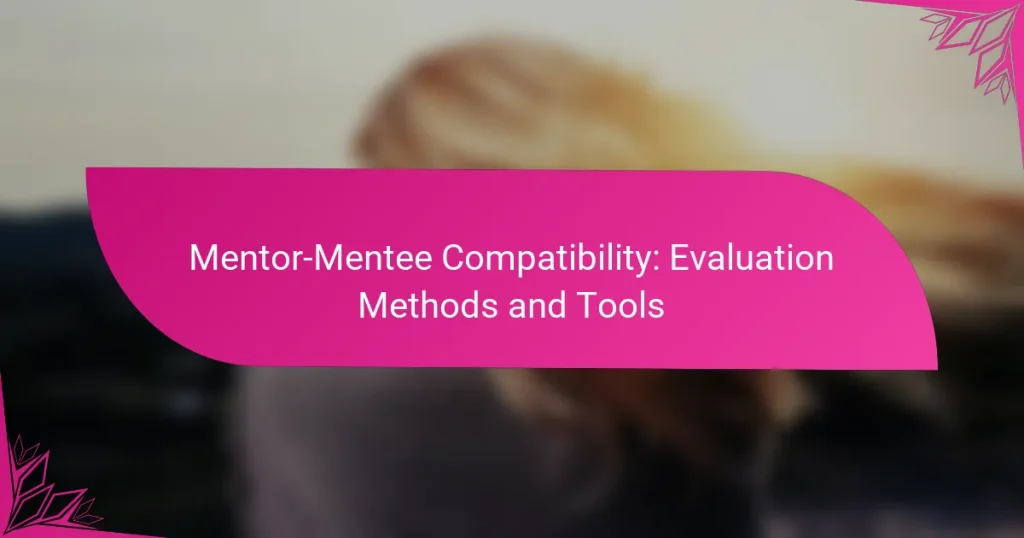Evaluating mentor-mentee compatibility is crucial for fostering a productive relationship, as it involves assessing shared values, goals, and communication styles. Utilizing effective methods such as assessment tools, structured interviews, and personality tests can enhance this evaluation process, ensuring both parties align in their objectives and approaches. By focusing on these criteria, mentors and mentees can better track their progress and address areas for improvement, ultimately leading to a more beneficial partnership.

How to evaluate mentor-mentee compatibility?
Evaluating mentor-mentee compatibility involves assessing shared values, goals, and communication styles to ensure a productive relationship. Effective methods include using assessment tools, structured interviews, personality tests, and feedback surveys to gauge compatibility.
Compatibility assessment tools
Compatibility assessment tools help identify the strengths and weaknesses of potential mentor-mentee pairs. These tools often include questionnaires or software that analyze various factors such as interests, skills, and learning styles.
When selecting a tool, consider its ease of use and the depth of insights it provides. Popular options may include online platforms that offer customizable assessments tailored to specific fields or industries.
Structured interviews
Structured interviews involve a set of predetermined questions aimed at uncovering the motivations and expectations of both the mentor and mentee. This method allows for a focused discussion that can reveal compatibility in communication styles and professional goals.
To conduct a structured interview, prepare questions that explore past experiences, preferred learning methods, and long-term aspirations. Aim for clarity and openness to foster a comfortable dialogue.
Personality assessments
Personality assessments can provide valuable insights into the traits and behaviors of both mentors and mentees. Tools like the Myers-Briggs Type Indicator or the Big Five Personality Test help identify compatibility in working styles and interpersonal dynamics.
When using personality assessments, ensure both parties understand their results and how they relate to the mentoring relationship. This understanding can guide the development of effective communication strategies and conflict resolution techniques.
Feedback surveys
Feedback surveys are essential for ongoing evaluation of the mentor-mentee relationship. These surveys can assess satisfaction levels, communication effectiveness, and progress towards goals, allowing for adjustments as needed.
Implement surveys at regular intervals, such as quarterly or biannually, to gather insights from both parties. Keep questions concise and focused on specific aspects of the relationship to facilitate constructive feedback.

What are the best tools for mentor-mentee evaluation?
The best tools for mentor-mentee evaluation focus on facilitating communication, gathering feedback, and assessing compatibility. These platforms help both mentors and mentees track their progress, identify strengths, and address areas for improvement.
MentorMatch platform
MentorMatch is designed to enhance the mentor-mentee pairing process by using algorithms to assess compatibility based on skills, goals, and preferences. Users can create profiles that highlight their experience and aspirations, allowing for more tailored matches.
This platform also includes features for setting objectives and tracking progress over time. Regular check-ins and feedback tools help ensure that both parties remain aligned and can adjust their approach as needed.
MentorcliQ software
MentorcliQ offers a comprehensive solution for managing mentorship programs, including evaluation tools that allow users to assess relationships and outcomes. The software provides customizable surveys and metrics to gauge satisfaction and effectiveness.
With its analytics dashboard, organizations can monitor engagement levels and identify trends in mentor-mentee interactions. This data-driven approach helps in refining mentorship strategies and improving overall program success.
SurveyMonkey for feedback
SurveyMonkey is a versatile tool for collecting feedback from both mentors and mentees. It allows users to create tailored surveys to evaluate the effectiveness of their mentoring relationship, focusing on communication, goal achievement, and satisfaction levels.
To maximize its effectiveness, consider using a mix of quantitative and qualitative questions. Regularly scheduled surveys can help track progress over time and identify any issues that may arise, ensuring that both parties remain engaged and productive in their mentorship journey.

What criteria should be used for compatibility assessment?
Compatibility assessment between a mentor and mentee should focus on shared goals, communication styles, and the alignment of experience and expertise. Evaluating these criteria helps ensure a productive and beneficial relationship for both parties.
Shared goals and values
Shared goals and values form the foundation of a successful mentor-mentee relationship. Both individuals should have a clear understanding of what they hope to achieve, whether it’s career advancement, skill development, or personal growth.
To assess compatibility, discuss your long-term objectives and core values openly. For example, if a mentee values innovation while the mentor prioritizes stability, this misalignment could hinder progress.
Communication styles
Effective communication is crucial for mentor-mentee compatibility. Different individuals have varying preferences for how they express ideas and receive feedback, which can impact the relationship’s success.
Consider whether you prefer direct, concise communication or a more detailed, narrative approach. A mismatch in styles can lead to misunderstandings, so it’s beneficial to establish a communication framework early on, such as regular check-ins or preferred channels (email, video calls).
Experience and expertise alignment
Aligning experience and expertise is vital for a fruitful mentor-mentee dynamic. A mentor should possess knowledge and skills relevant to the mentee’s goals, providing guidance that is both applicable and insightful.
Evaluate the mentor’s background and areas of expertise against the mentee’s aspirations. For instance, if a mentee seeks to enter a specific industry, a mentor with extensive experience in that field can offer invaluable insights and connections. Aim for a mentor who has navigated similar challenges and can share practical strategies.

How to improve mentor-mentee matching processes?
Improving mentor-mentee matching processes involves leveraging data, maintaining consistent communication, and establishing a robust feedback system. These strategies enhance compatibility and ensure both parties benefit from the relationship.
Utilizing data analytics
Data analytics can significantly enhance mentor-mentee matching by analyzing past interactions, preferences, and outcomes. By collecting data on skills, experiences, and goals, organizations can identify patterns that lead to successful pairings.
Consider using surveys or assessments to gather information about potential mentors and mentees. This data can be processed to create compatibility scores, helping to match individuals with similar interests and complementary skills.
Implementing regular check-ins
Regular check-ins between mentors and mentees are crucial for maintaining engagement and addressing any issues early. Scheduling these meetings, whether weekly or bi-weekly, ensures that both parties stay aligned on goals and expectations.
During check-ins, encourage open discussions about progress, challenges, and any adjustments needed in their approach. This proactive communication helps build trust and strengthens the mentor-mentee relationship.
Creating a feedback loop
Establishing a feedback loop allows both mentors and mentees to share their experiences and insights. This can be done through structured surveys or informal conversations, providing valuable information on what works and what doesn’t.
Use the feedback to refine the matching process and improve future pairings. Regularly reviewing this information can help identify trends and areas for improvement, ensuring that the mentoring program evolves to meet the needs of participants effectively.

What are common challenges in mentor-mentee compatibility?
Common challenges in mentor-mentee compatibility include differing expectations and cultural differences. These issues can hinder effective communication and relationship-building, making it difficult for both parties to achieve their goals.
Mismatch of expectations
A mismatch of expectations occurs when the mentor and mentee have different views on the mentoring process. For instance, a mentee may seek regular feedback and hands-on guidance, while a mentor might assume a more hands-off approach, expecting the mentee to take initiative.
To avoid this pitfall, both parties should clearly communicate their goals and preferred mentoring styles at the outset. A simple checklist of expectations can help ensure alignment, covering aspects like meeting frequency, communication methods, and desired outcomes.
Cultural differences
Cultural differences can significantly impact mentor-mentee compatibility, especially in diverse environments. Variations in communication styles, values, and professional norms may lead to misunderstandings or discomfort.
To navigate cultural differences, mentors and mentees should engage in open discussions about their backgrounds and perspectives. This can foster mutual respect and understanding, allowing both parties to adapt their approaches. Being aware of cultural nuances can enhance the mentoring experience and promote a more inclusive atmosphere.


